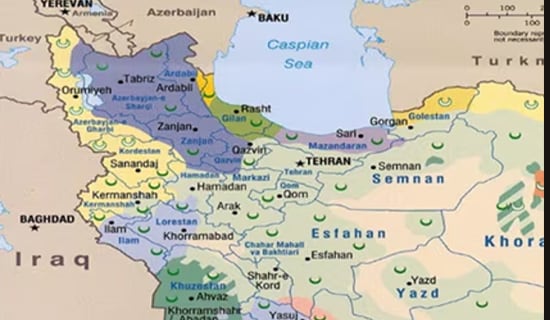On July 21, 2013, former Iraqi MP and liberal scholar Ayad Jamal Al-Din was interviewed by Al-Arabiya TV about the Sunni-Shi'ite rift in the region and claimed that the Syrian opposition's marginalization of non-Sunni minorities would cause them to unite under the Shi'ite banner of Iran.
Following are excerpts from the interview:
Click here to view this clip on MEMRI TV.
"The Problem Is That The Syrian Opposition, In Its Stupidity, Kindled The Hostility Of The Shi'ites"
Ayad Jamal Al-Din: "There is no dispute [between Najaf and Qom], only a difference in approach. The jurisprudence center of Najaf takes a hands-off approach in grave political matters that involve bloodshed and killing.
"The silence of the Najaf jurisprudence center regarding the crisis in Syria highlights even further its silence in the days of the U.S. invasion of Iraq. Then too, Najaf remained silent and did not call upon the people to fight the Americans."
Interviewer: "The Saddam regime tried to..."
Ayad Jamal Al-Din: "This has been their approach. The jurisprudence center in Qom, in contrast, issues fatwas inciting to Jihad. So there are two different approaches, but what is important is the public opinion among the Shi'ites.
"It is not that Shi'ite public opinion, in Iraq and elsewhere, is supportive of President Al-Assad, but the Shi'ites unanimously defend the shrine of Sayyida Zaynab. Arabs or non-Arabs who are concerned about the situation in Syria must know that there is such a thing known as Shi'ite Muslims, who have a presence in Iraq, Syria, Iran, and Lebanon, and who will not give in – not out of love for Al-Assad, but because the Shi'ites consider Sayyida Zaynab to be far more sacred than her mother, Fatima Al-Zahra, daughter of the Prophet Muhammad, and more sacred than her father, Imam Ali, because she was taken as a prisoner to Syria and buried there.
The problem is that the Syrian opposition, in its stupidity, kindled the hostility of the Shi'ites. The Shi'ites never intended to fight for the secular Syrian regime. Absolutely not. [...]
"The Shi'ite public today takes a much more extreme position than that of the Qom jurisprudents.
"And another thing – who will ultimately benefit from this war? Undoubtedly, it is Iran that will stand to gain from it. This does not make me happy, but it is the truth. When a doctor tells a patient that he is suffering from cancer, he did not cause the cancer, and he is not happy about it, but it is the truth."
"Today, Iran Does Not Need To Labor In Order To Win The Iraqi Shi'ites Over. The Flock To Iran Of Their Own Accord"
"The Shi'ites have never been in accord about anything like they agree today on the need to defend the shrine of Sayyida Zaynab. The Shi'ites have never agreed to follow the Rule of the Jurisprudent, yet today, they all follow the Rule of the Jurisprudent, as the defender..."
Interviewer: "Really?"
Ayad Jamal Al-Din: "Absolutely. It is considered the defender of the Shi'ites. The Shi'ites fear for their holy places, and this leads them to think that Iran is the only one that can support them."
Interviewer: "Is this fear for their holy places or fear for their very existence?"
Ayad Jamal Al-Din: "It is one and the same. The holy places are one's existence, and vice versa. What are the Shi'ites worth without their holy places?
"The existence of the Shi'ites is currently in peril. Today, Iran does not need to labor in order to win the Iraqi Shi'ites over. They flock to Iran of their own accord. I'm not talking just about the Twelver Shi'a, but about the Ismaelis, the Druze, the Zaidis, and others. All the Shi'ite factions, which split more than 1,200 years ago, will unite under the banner of the Rule of the Jurisprudent in Iran, as a result of the stupidity of the Syrian opposition and of the Arab regimes, which support sectarian TV channels that talk about the unity of Sunni blood – the Shi'ites out, the Druze out, the Alawites out, the Christians out...
"When you talk about the unity of Sunni blood, there will be people who will call for the unity of Shi'ite blood. Then there will be no distinction between the Iraqi Shi'ites, who used to take pride in their Arab identity and nationality... Let us not forget that the first fatwa in Shi'ite history [on this issue], issued by Imam Muhsin Al-Hakim in 1968, stated that the khums tax could be paid to Yasser Arafat and the PLO.
"Today, the slogans in Iran say: 'No to Gaza, and no to Lebanon. We will sacrifice our lives for Iran.' When they say: 'No to Lebanon,' they are referring to Hizbullah.
"I have seen the same thing in Najaf. They don't want to hear about Palestine. They don't care about Israel. They say: 'We are Shi'ites, and that's it.'
"Many issues are interconnected, but the only one that stands to gain and that will become the leader of the Shi'ites worldwide is Iran and the Rule of the Jurisprudent." [...]
"What Was Happening In Syria Was An Internal Matter... Now Things Have Changed, And It Has Become An Overt Sectarian War"
"The [Syrian] opposition represents the [Sunni] majority, and the majority must give a sense of security to the minorities, not say: 'The Christians to Beirut, and the Alawites to the coffins.' Such calls ignite fire in people's hearts and terrorize them. They are afraid. You should fear the intimidated, not those who feel secure. Someone who is afraid will do anything to protect himself. That is why the Alawites, the Druze, the Ismailis, and all the other minorities in the Middle East, even the Christians, will join forces with the largest minority in the region – the Shi'ites. [...]
"What was happening in Syria was an internal matter: a people rising up against a dictatorship, and waging demonstrations, just like in Egypt and elsewhere. Now, things have changed, and it has become an overt sectarian war between Jabhat Al-Nusra and Hizbullah, between Al-Qaeda and Hizbullah. This makes the U.S. and Israel happy. Their enemies are fighting one another.
"Therefore, in my opinion, there is no solution for Syria on the horizon. This war will continue for a long time, and much pure Muslim blood will be spilled – and they deserve it, by the way. They have a lot of blood to spill..."
Interviewer: "It doesn't make sense to say that they enjoy bloodshed."
Ayad Jamal Al-Din: "They love it! What kind of person would like to blow himself up or fight?" [...]
Interviewer: "Do you think that the extremist groups may be contained the way they were contained in Iraq, through the tribes and the awakening councils? By stripping them of popular support?"
Ayad Jamal Al-Din: "It's not going to happen. The awakening councils existed alongside the military presence of the Americans and their allies."
Interviewer: "So it will be harder..."
Ayad Jamal Al-Din: "No, it was all done with American support. What did these councils do? They provided information in return for dollars. The real killing was carried out by the American Apache helicopters. The councils would inform them that Al-Qaeda was in a certain place, and the U.S. helicopters would come and kill them. No more and no less.
"If awakening councils are established in Syria to fight Al-Qaeda, they will be defeated. Al-Qaeda are ideological fighters. What ideology is the Free Syrian Army fighting for? For democracy? Obviously not. The awakening councils enjoyed partial success in Iraq because of the presence of U.S. troops. The moment America withdrew, these councils evaporated." [...]








